7动词——基础训练
动词专项练习【基础版】(附答案和详细解析)

动词专项练习【基础版】(附答案和详解)一. 单项选择1. Where _______ Uncle Sun yesterday?A. wasB. wereC. didD. does2. They _______ going to see Mr. Sun tomorrow.A. isB. areC. amD. be3. Some are _______ in the river and some are _______ games.A.swiming, playingB. swimming, plaiingC. swimming, playingD. swimming, plaing4. Where is Dick? He _______ to the reading-room.A. has beenB. wentC. has goneD. goes5. Mark Twain, an American writer, _______ everybody here.A. knowsB. is known asC. is known toD. is known for6. I hope he will come to see me before he _______ here.A. leaveB. leavesC. will leaveD. left7. My teacher told me that Australians _______ English.A. spokeB. speakC. speaksD. are speaking8. I think she _______ right now.A. readingB. readsC. is readingD. read9. --Where are the children? --They _______ a good time in the garden.A. are havingB. haveC. have hadD. had10. -- Where _______ my glasses? I can't find them.--- I _______ them on the bookshelf, but they aren't there.A.you put, putB. you have put, have putC. have you put, putD. did you put, have put11. When the police arrived, the man _______ for 10 minutes.A. diedB. was deathC. had diedD. had been dead12. By the time this talk is over, we _______ a lot about the earth.A. shall be learningB. are learningC. world learnD. shall have learnt13.. He _______ worried when he heard this news.A. isB. wasC. doesD. did14. Shall we _______ football this Saturday?A. playB. playingC. playsD. to play15. The children _______ at school now.A. isB. areC. wasD. were16.It's surprising that Mr. Wang's little daughter_____ speak English so well.A.mustB.canC. mustn'tD.can't17.I ______speak well until I was five years old.A.couldn'tB.couldC.canD.can't18.Who ______ it be? It is so late.A.Can'tB. couldn'tC.canD.must19._____ I ask you a question?—Of course, you______.A.can;canB. should;canC.can; shouldD. can; shouldn't20.—Must I go with them?—No, you __________.A.mustB.mustn'tC.needn'tD.don't need21.—Must I wait here all morning? I have a lot of work to do.—No,you______. You may be back in the afternoon.A.mustn'tB.can'tC.don't have toD.need22.—Oh, It's raining hard.—Be careful! The road ______ be wet.A.couldB. mustC.mightD. can’t23.I______ help you if you meet with trouble.A.WillB. wouldC.mustD.can't24.She said she ______ try her best to help me.A.WillB.wouldC. won'tD.shall25.I______ a lot but I don't play it very often now.e to play tennisB.was used to play tennisC.am used to play tennised to play tennis26.—Need I tell him everything about the truth?—Yes, __________.A.you needB. you shouldC. you mustD. you can27.—Do I need to leave my phone number and address?—No, _________.A.you need toB. you don't need toC. you mustD.you can't28. How long may I _______ the library book , please ?A. lendB. keepC. borrowD. return29. It's very hot here . You'd better _______ your coat .A. put onB. get onC. take offD. put in30. Remember to _______ the lights after school .A. turn offB. turn downC. turn upD. turn on二. 参考答案1.【句意】山姆叔叔昨天在哪里?【解析】选A。
英语基础训练参考答案
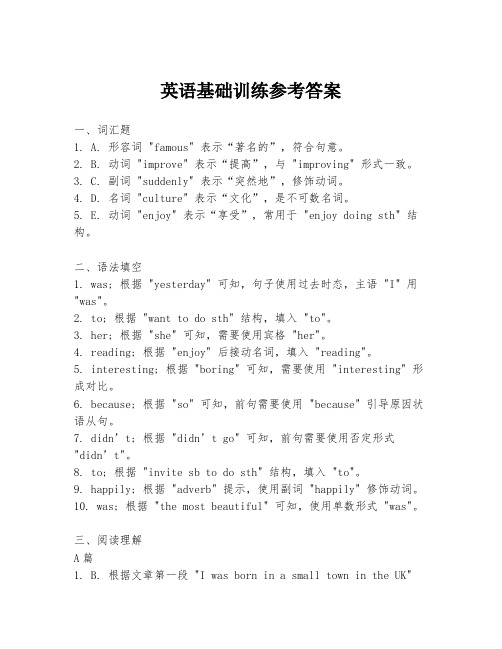
英语基础训练参考答案一、词汇题1. A. 形容词 "famous" 表示“著名的”,符合句意。
2. B. 动词 "improve" 表示“提高”,与 "improving" 形式一致。
3. C. 副词 "suddenly" 表示“突然地”,修饰动词。
4. D. 名词 "culture" 表示“文化”,是不可数名词。
5. E. 动词 "enjoy" 表示“享受”,常用于 "enjoy doing sth" 结构。
二、语法填空1. was; 根据 "yesterday" 可知,句子使用过去时态,主语 "I" 用"was"。
2. to; 根据 "want to do sth" 结构,填入 "to"。
3. her; 根据 "she" 可知,需要使用宾格 "her"。
4. reading; 根据 "enjoy" 后接动名词,填入 "reading"。
5. interesting; 根据 "boring" 可知,需要使用 "interesting" 形成对比。
6. because; 根据 "so" 可知,前句需要使用 "because" 引导原因状语从句。
7. did n’t; 根据"didn’t go" 可知,前句需要使用否定形式"didn’t"。
8. to; 根据 "invite sb to do sth" 结构,填入 "to"。
9. happily; 根据 "adverb" 提示,使用副词 "happily" 修饰动词。
人教版七年级上册情态动词专项训练(含答案)
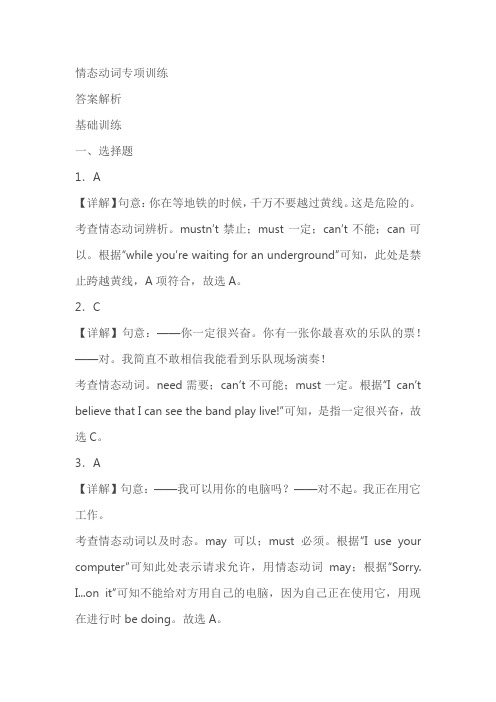
情态动词专项训练答案解析基础训练一、选择题1.A【详解】句意:你在等地铁的时候,千万不要越过黄线。
这是危险的。
考查情态动词辨析。
mustn’t禁止;must一定;can’t不能;can可以。
根据“while you’re waiting for an underground”可知,此处是禁止跨越黄线,A项符合,故选A。
2.C【详解】句意:——你一定很兴奋。
你有一张你最喜欢的乐队的票!——对。
我简直不敢相信我能看到乐队现场演奏!考查情态动词。
need需要;can’t不可能;must一定。
根据“I can’t believe that I can see the band play live!”可知,是指一定很兴奋,故选C。
3.A【详解】句意:——我可以用你的电脑吗?——对不起。
我正在用它工作。
考查情态动词以及时态。
may可以;must必须。
根据“I use your computer”可知此处表示请求允许,用情态动词may;根据“Sorry.I...on it”可知不能给对方用自己的电脑,因为自己正在使用它,用现在进行时be doing。
故选A。
【详解】句意:——我们必须帮助他完成工作吗?——不,不必,他可以自己完成工作。
考查情态动词。
must表示“必须”,用must提问时,其否定回答用needn’t或don't have to。
can表示“可以,能够”,表示不必帮他,他能自己完成工作,故选C。
5.B【详解】试题分析:句意,北京的医生们尽他们最大的努力救杭州市长的性命,但是他还是死于心脏病,享年58岁。
do all sb can to do,did all sb could to do ,是尽某人所能去做某事的意思,故选择B。
考点:考查情态动词。
6.C【详解】句意:——托尼,我们课上能戴帽子吗?——不,我们不能。
考查情态动词。
must必须;have to不得不;can能;need需要。
根据回答“No, we can’t”可知,此处是问“能戴帽子吗”,用情态动词can。
动词基本形式专项练习

动词基本形式专项练习(总4页)--本页仅作为文档封面,使用时请直接删除即可----内页可以根据需求调整合适字体及大小--动词基本形式专项练习用所给动词的适当形式填空。
1. She __________(go) to Hongxing Primary School every day.2. Her hobby is ___________ _(sing and dance).3. They enjoy __________ (plant) flowers and _________(grow) vegetables.4. Are you good at ____________(fish) No, I am not.5. Does he enjoy ____________(listen) to music Yes, he does.6. I __________(play) with a monkey yesterday. I __________(put) my jacketon it. It __________(run) away!7. Bob likes ____________(sing) English songs.一般现在时专项练习I. 用所给动词的适当形式填空。
1. I should ___________ (take) a down coat, a scarf and boots.2. On our National Day, people usually __________(go) to Tian’anmen Square.2. Peter ___________ (not make) noise in class.3. She ___________ (have) curly blond hair and dark blue eyes.4. She never __________ (watch) TV the whole evening.5. I usually ___________ (get) an A on English tests this year.6. ___________ (not stay) up very late.7. We ___________ (not go) out in the evening.8. The light is red. We must ___________ (wait).9. Can a fish __________(fly) No, it can’t.__________(do) she __________(go) to school every day-She __________(go) to Hongxing Primary School.II.根据要求改写下面的句子。
动词基本形式练习题基础、提高、难题_汇总(含答案)
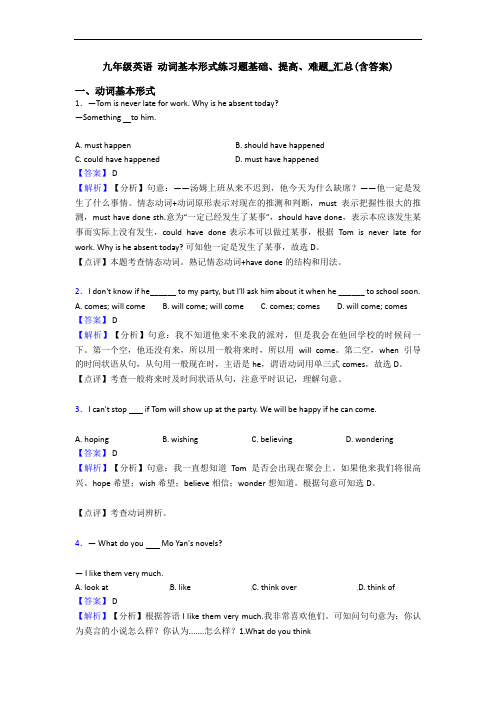
九年级英语动词基本形式练习题基础、提高、难题_汇总(含答案)一、动词基本形式1.—Tom is never late for work. Why is he absent today?—Something to him.A. must happenB. should have happenedC. could have happenedD. must have happened【答案】 D【解析】【分析】句意:——汤姆上班从来不迟到,他今天为什么缺席?——他一定是发生了什么事情。
情态动词+动词原形表示对现在的推测和判断,must表示把握性很大的推测,must have done sth.意为“一定已经发生了某事”,should have done,表示本应该发生某事而实际上没有发生,could have done表示本可以做过某事,根据Tom is never late for work. Why is he absent today? 可知他一定是发生了某事,故选D。
【点评】本题考查情态动词。
熟记情态动词+have done的结构和用法。
2.I don't know if he______ to my party, but I'll ask him about it when he ______ to school soon.A. comes; will comeB. will come; will comeC. comes; comesD. will come; comes【答案】 D【解析】【分析】句意:我不知道他来不来我的派对,但是我会在他回学校的时候问一下。
第一个空,他还没有来,所以用一般将来时,所以用will come。
第二空,when引导的时间状语从句,从句用一般现在时,主语是he,谓语动词用单三式comes,故选D。
【点评】考查一般将来时及时间状语从句,注意平时识记,理解句意。
动词时态语基础训练
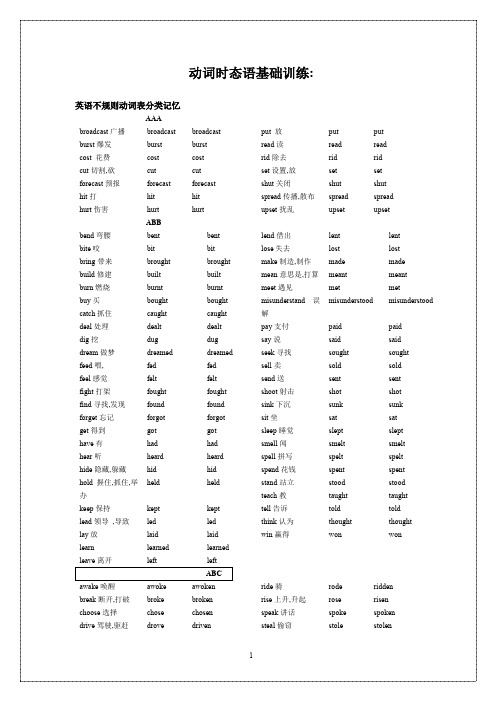
动词时态语基础训练:英语不规则动词表分类记忆AAAbroadcast广播broadcast broadcast burst爆发burst burst cost 花费cost costcut切割,砍cut cut forecast预报forecast forecast hit打hit hithurt伤害hurt hurt put 放put put read读read read rid除去rid rid set设置,放set set shut关闭shut shut spread传播,散布spread spread upset扰乱upset upsetABBbend弯腰bent bent bite咬bit bit bring带来brought brought build修建built built burn燃烧burnt burnt buy买bought bought catch抓住caught caught deal处理dealt dealt dig挖dug dug dream做梦dreamed dreamed feed喂, fed fedfeel感觉felt felt fight打架fought fought find寻找,发现found found forget忘记forgot forgot get得到got got have有had had hear听heard heard hide隐藏,躲藏hid hid hold握住,抓住,举办held held keep保持kept kept lead领导,导致led ledlay放laid laid learn learned learned leave离开left left lend借出lent lentlose失去lost lostmake制造,制作made mademean意思是,打算meant meantmeet遇见met met misunderstand误解misunderstood misunderstood pay支付paid paidsay说said saidseek寻找sought soughtsell卖sold soldsend送sent sentshoot射击shot shotsink下沉sunk sunksit坐sat satsleep睡觉slept sleptsmell闻smelt smeltspell拼写spelt speltspend花钱spent spentstand站立stood stoodteach教taught taughttell告诉told toldthink认为thought thoughtwin赢得won wonawake唤醒awoke awoken break断开,打破broke broken choose选择chose chosen drive驾驶,驱赶drove driven ride骑rode ridden rise上升,升起rose risen speak讲话spoke spoken steal偷窃stole stolenblow吹blew blown draw画,抽出drew drawn fly飞flew flown grow生长grew grown know知道knew known throw扔出threw thrown forbid禁止forbade forbad forgive原谅forgave forgiven give给gave given eat吃ate eaten see看见saw seen fall落下,跌倒fell fallen mistake弄错,犯错mistook mistaken shake摇动shook shaken show出示,展示showed shown take 拿走,带走took taken bear出生,忍受bore borndo 做did donego去went gone drink喝drank drunk ring响rang rung run跑ran run sing唱歌sang sung swim游泳swam swumABAbecome成为became become come来came come overcome克服overcame overcome run跑ran run一、一般现在时:重点掌握:一般现在第三人称单数动词的变化规律,完成下列句子并总结规律1.He __________(come) from Australia.2.Mary ____________(have) a nice car.3.The man _______(live) in the countryside.4.The writer ____(tell) us that it is veryimportant.5.Mr. Smith ________(say) that it isconvenient to travel by plane.6.De Qing ____(lie) in the west of GuangDong.7.It ________(take) him an hour to ride a bikefrom home to school.8.Kate _______(like) listening to soft music. 规律:________________________________9.He _____(go) to school by bike sometimes.10.She ________(do) her homework everyday.11.John ________(watch) TV every night.12.Lily _______(teach) us English.13.My mother _______(wash) clothes for me,if I am busy.规律:________________________________ 14.He ___________(try) his best to studyEnglish well and he is confident in himself.15.This kind of bird__________(fly) back herein winter every year. 16.Jane __________(envy) her sister andalways plays jokes on her.17.He ___________(study) hard and he is thebest student in our class.规律:________________________________二、一般过去时(定义:过去事物的状态,或经常发生的的动作)重点掌握:在语法填空常考,在写作尤其是在任务型写作举例子时中常用。
整理仁爱英语七、八年级动词及练习
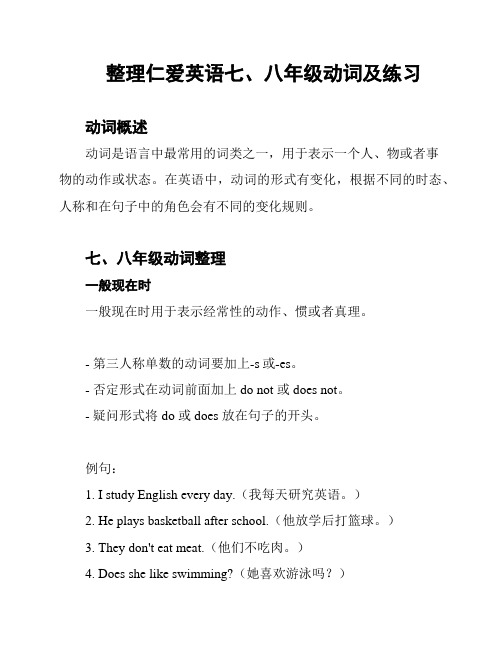
整理仁爱英语七、八年级动词及练习动词概述动词是语言中最常用的词类之一,用于表示一个人、物或者事物的动作或状态。
在英语中,动词的形式有变化,根据不同的时态、人称和在句子中的角色会有不同的变化规则。
七、八年级动词整理一般现在时一般现在时用于表示经常性的动作、惯或者真理。
- 第三人称单数的动词要加上-s或-es。
- 否定形式在动词前面加上 do not 或 does not。
- 疑问形式将 do 或 does 放在句子的开头。
例句:1. I study English every day.(我每天研究英语。
)2. He plays basketball after school.(他放学后打篮球。
)3. They don't eat meat.(他们不吃肉。
)4. Does she like swimming?(她喜欢游泳吗?)现在进行时现在进行时用于表示现在进行的动作或情况。
- 动词用-ing 结尾。
- 现在进行时由助动词 be 和动词的现在分词构成。
例句:1. She is reading a book now.(她正在看书。
)2. They are playing soccer in the park.(他们正在公园里踢足球。
)一般过去时一般过去时用于表示过去某个时间发生的动作或情况。
- 动词过去式的构成有规律和不规律两种。
- 一般过去时由动词的过去式构成。
例句:1. I watched a movie last night.(昨晚我看了一场电影。
)2. She studied English when she was in high school.(她上高中时研究英语。
)过去进行时过去进行时用于表示过去某个时间正在进行的动作或情况。
- 动词用-ing 结尾。
- 过去进行时由助动词 was/were 和动词的现在分词构成。
例句:1. They were playing games at that time.(那个时候他们正在玩游戏。
初级动词练习题

初级动词练习题一、用括号中所给动词的正确形式填空。
1. I often (go) to the park on Sundays.2. They (play) basketball every afternoon.3. She (read) a book now.4. We (watch) a movie last night.5. He usually (do) his homework in the evening.6. My cat (sleep) on the sofa at the moment.7. Tom (study) English every morning.8. They (cook) dinner for their parents tomorrow.9. Maria (dance) beautifully at the party yesterday.10. We (swim) in the pool last summer.二、根据句意及所给动词的适当形式填空。
1. Look! The sun (shine) brightly in the sky.2. I (enjoy) listening to music in my free time.3. The cat (jump) off the table just now.4. They (travel) to Paris next month.5. Sarah (write) a letter to her best friend yesterday.6. The students (play) football on the playground now.7. My parents (work) in an office.8. We (call) our friends last night.9. The dog (bark) loudly outside the house.10. He (buy) a new car last week.三、根据汉语意思完成句子,每空一词。
- 1、下载文档前请自行甄别文档内容的完整性,平台不提供额外的编辑、内容补充、找答案等附加服务。
- 2、"仅部分预览"的文档,不可在线预览部分如存在完整性等问题,可反馈申请退款(可完整预览的文档不适用该条件!)。
- 3、如文档侵犯您的权益,请联系客服反馈,我们会尽快为您处理(人工客服工作时间:9:00-18:30)。
动词——基础训练
一、单项选择。
1. Bridge will as general manager when Mitchell retires.
A. get away
B. take over
C. set off
D. run out
2.Try not to cough more than you can since it may cause problems to your lungs.
A. check
B. allow
C. stop
D. help
3.At the last moment, Tom decided to a new character to make the story seem more likely.
A. put up
B. put in
C. put on
D. put off
4.Would you like to with us to the film tonight?
A. come along
B. come off
C. come across
D. come through
5.The watch was very good, and he 20 percent down for it.
A. paid
B. cost
C. bought
D. spent
6.Traditionally, college students hold a graduation ceremony to encourage themselves before they
On their life journey.
A. give up
B. settle down
C. get though
D. set off
7.Michelle found a job as a high school teacher which spending quite a lot of time with students.
A. enjoys
B. involves
C. practices
D. suggests
8.Old-fashioned phones matter when wireless networks in disasters.
A. turn down
B. turn out
C. break down
D. break out
9.While intelligent people can often the complex, a fool is more likely to complicate the simple.
A. sacrifice
B. substitute
C. simplify
D. survive
10.According to the law, all foreigners have to with the local police within two weeks of arrival.
A. associate
B. dispute
C. negotiate
D. register
11.We to paint the whole house but finished only the front part that day.
A. set about
B. set up
C. set out
D. set down
12.——Did you ask Sophia for help?
——I need to ——I managed perfectly well on my own.
A. wouldn’t
B. don’t
C. didn’t
D. won’t
13.Mary is really good at taking notes in class. She can almost every word her teacher says.
A. put out
B. put down
C. put away
D. put together
14.If she doesn’t want to go, nothing you can say will her.
A. persuade
B. promise
C. invite
D. support
15.The athlete’s years of hard training when she finally won the Olympic gold medal.
A. went on
B. got through
C. paid off
D. ended up
二、单句改错。
1.A fire broke up in a hospital last night, but no one was killed.
2.I can’t find my wallet. I must have forgotten it in the hotel.
3.Who will hand over the company since Ewing has resigned.
4.The forest guards often find campfires that have not been put away completely.
5.You should match yourself to the new environment quickly.
6.Now many people are working hard to earn enough money to keep up the high pace of modern society.
7.Some passengers complain that it usually spends so long to fill in travel insurance documents..
8.Sometimes it’s not easy to realize a man’s voice on the phone.
9.Mike easily becomes bad in hot weather. You’d better put it into the refrigerator.
10.The folk song concert was so well accepted that all the tickets had been sold out on the first day.
三、选词填空。
put up with count on bring up break into get over
set aside turn down call for give up go in for
1.A thief his house last night; but luckily nothing was stolen.
2.He was by his grandparents, so his parents seemed to be strangers to him.
3.The children are absorbed in reading in the next room. Will you the radio a little?
4.Though suffering a serious injury, he refused to the game and went on.
5.I don’t rock and roll, for it’s too noisy for my taste.
6.Success hard work and opportunities.
7.You can Jane. She is a trust-worthy girl.
8.There is a party going on upstairs. I really can’t the big noise.
9.Although she was received some training, she still can’t her shyness.
10.Mary two hours every Sunday afternoon to spend with her son.。
